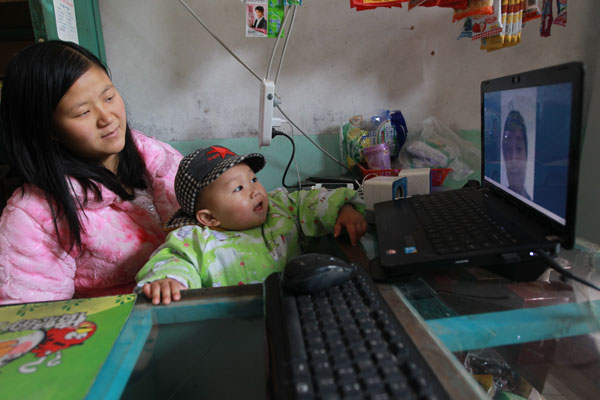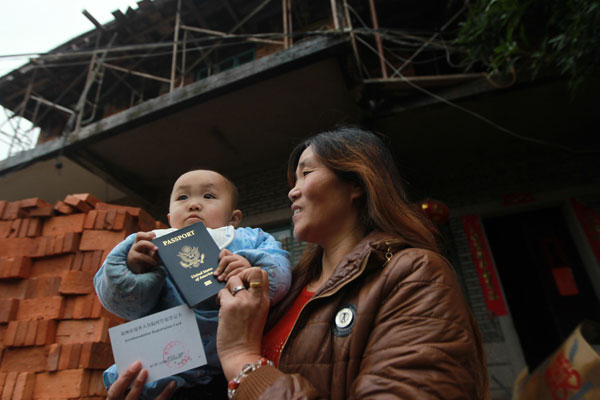The 'left-behind' generation
Updated: 2012-12-26 08:39
By He Na and Hu Meidong (China Daily)
|
||||||||
"He's my brother's son. My brother went to the United States five years ago. The boy was born in New York, but my brother works at a restaurant in a southern state," said Li Xiaoming. "The boy was sent to Guantou when he was eight months old. For the past four months, he has cried heavily at night and we know he's looking for his mom."
 |
|
Olsen sits with his aunt in front of the computer. At 11 am every day, he has a video chat with his parents in the United States. Photo by Cui Meng / China Daily |
Large-scale emigration
Currently, more than 2,000 overseas-born children, known in China as "left-behind" kids, live with grandparents or relatives in Guantou.
"Almost every family here has some one working overseas. Although their footsteps cover more than 30 countries, most have gone to the US, Canada and Japan," said Lin Xiuzhu, president of Guantou Overseas Chinese Kindergarten, the largest in the town, where more than 90 percent of the students are foreign nationals.
"When I opened the kindergarten in 2005, there were only 80 foreign-born kids, but the number has increased sharply year by year. We have nine classes now and the number of kids has soared to 380. To guarantee quality of tuition, we no longer recruit children younger than 3," she said.
 |
|
Huang Jie is one of the children left behind in Fujian province by parents who work abroad. Cui Meng / China Daily |
Other regions in Fujian, such as Mawei district in Fuzhou, Fuqing city, Changle city and Luoyuan county are also playing host to kids born to Chinese parents overseas.
Around 20,000 children with US nationality live in Fuzhou, said Zheng Qi, president of the Fukien Benevolent Association of America, quoted in the Fuzhou Evening News. If you include those holding other nationalities, the number could be as high as 60,000, he said.
Guangdong province and a number of other costal regions are experiencing the same thing. Enping in Guangdong has acquired the nickname "Little United Nations" because of the number of children born overseas.
Large-scale emigration means that the population of Guantou is mainly composed of elders and children. Most young people in the town hail from Sichuan province.
"Because most Chinese living overseas do manual work, in restaurants and suchlike, or run their own small businesses, the heavy workload makes the task of taking care of small children impossible, irrespective of whether they have been granted foreign nationality," said Lin Xiuzhu.In addition, many countries have strict child-care regulations. If parents are perceived to be failing their kids and are reported, they run the risk of having their children taken into care. Some parents could even be imprisoned.
Many young couples see no alternative but to send their kids back to their parents when they are only a few months old. The kids are often taken abroad again aged 4 or 5 to attend elementary school.

 Relief reaches isolated village
Relief reaches isolated village
 Rainfall poses new threats to quake-hit region
Rainfall poses new threats to quake-hit region
 Funerals begin for Boston bombing victims
Funerals begin for Boston bombing victims
 Quake takeaway from China's Air Force
Quake takeaway from China's Air Force
 Obama celebrates young inventors at science fair
Obama celebrates young inventors at science fair
 Earth Day marked around the world
Earth Day marked around the world
 Volunteer team helping students find sense of normalcy
Volunteer team helping students find sense of normalcy
 Ethnic groups quick to join rescue efforts
Ethnic groups quick to join rescue efforts
Most Viewed
Editor's Picks

|

|

|

|

|

|
Today's Top News
Health new priority for quake zone
Xi meets US top military officer
Japan's boats driven out of Diaoyu
China mulls online shopping legislation
Bird flu death toll rises to 22
Putin appoints new ambassador to China
Japanese ships blocked from Diaoyu Islands
Inspired by Guan, more Chinese pick up golf
US Weekly

|

|






